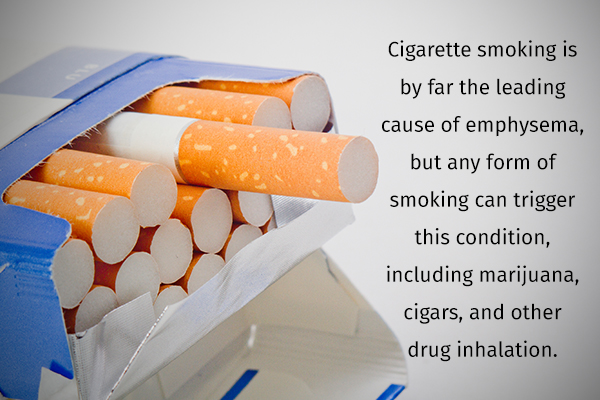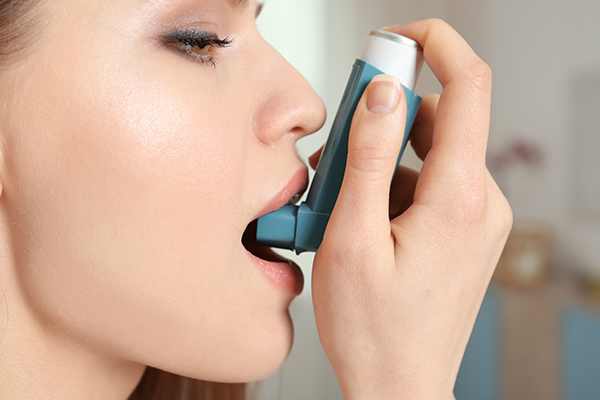In this article:
Emphysema is a type of chronic obstructive pulmonary disease (COPD) in which the part of the lungs that allows oxygen to enter the bloodstream (called alveoli) becomes damaged.

Repeated damage to the alveolar walls makes them increasingly thin, eventually causing them to rupture. The rupture of these alveoli creates large areas within the lungs that no longer participate in gas exchange – or the process of getting oxygen into your blood.
Major Difference Between Emphysema and COPD
Emphysema is a form of COPD, but not every person with emphysema has or develops COPD.
COPD has two main categories: emphysema and chronic bronchitis. COPD refers to a functional problem with the lungs, whereas emphysema refers to an anatomical problem with the lungs.
Different Stages of Emphysema
The medical community does not “stage” emphysema as some people have some emphysema but do not have changes in their lung function and therefore do not have COPD.
COPD, however, is divided into different stages using the GOLD (Global Initiative for Chronic Obstructive Lung Disease) classification system. COPD is diagnosed through pulmonary function testing. Depending on the amount of air you can forcefully exhale in 1 second (FEV1), you will be classified as GOLD stage 1 to 4, with stage 4 being the most advanced and severe stage.
In addition to lung function, the GOLD classification also includes a symptoms/risk severity rating. Depending on how many exacerbations of COPD you have had in the last year and the severity of the symptoms (using one of two well-validated questionnaires), a letter score from A to D will be assigned to the GOLD stage, where A means mild symptoms and low risk for exacerbations, while D means severe symptoms and high risk for exacerbations. (1)
After this classification, someone who has COPD with emphysema may be labeled as having “GOLD stage 3, category C” disease.
Common Causes of Emphysema

Cigarette smoking is by far the leading cause of emphysema, but any form of smoking can trigger this condition, including marijuana, cigars, and other drug inhalation.
Other causes that contribute to the development of emphysema include:
Symptoms of Emphysema
Emphysema typically manifests through the following symptoms:
- Shortness of breath
- Wheezing
- Chest tightness
- Fatigue
- Decreased exercise capacity
Treatment for Emphysema

If you have emphysema but without any symptoms or COPD, then avoiding exposure to toxins that can worsen your condition is really the only treatment. Making sure you have a healthy diet and exercise routine will help as well.
If you have been diagnosed with COPD due to your emphysema, then you should see your doctor for treatment options. The main treatment intervention for such cases is inhaler medications.
Since there are many different types of inhalers, it is important to consult your doctor to determine which one will work best for you. If this primary treatment fails to control your symptoms, seek consultation with a pulmonologist to explore more advanced treatment options.
Diagnosing Emphysema
Emphysema is diagnosed through chest imaging tests, typically by CT scan. (3) COPD is a problem with lung function, which is diagnosed through pulmonary function tests and can be caused by emphysema.
Emphysema is an anatomical defect with the lungs, sometimes without any lung function problems. There are three types of emphysema recognized by chest CT:
- Centrilobar – It is the most common form of emphysema, usually occurs at the top portions of the lungs, and is most closely linked with smoking.
- Panlobar – It affects all areas of the lungs equally and is most closely linked to genetic diseases.
- Paraseptal – It is located toward the edges of the lungs, usually in the top and middle portions of the lungs. It can be seen in smokers and nonsmokers and is most likely to cause bullae, or large holes in the lungs.
Tips to Manage Emphysema
The most important thing you can do for your lungs is to avoid inhaling any toxins. Wearing respirator masks when doing work that creates dust (carpentry, for instance) will be helpful.
Breathing exercises are also useful and can be practiced daily. One beneficial breathing exercise is pursed-lip breathing – breathe in through the nose for 2 seconds and breathe out through the mouth for 4–6 seconds while almost closing your lips.
If you have emphysema and symptoms, the best way to manage this is with your doctor or a pulmonologist to put together a medication, diet, and exercise plan that works best for you.
Dietary Recommendations for Patients With Emphysema
Excessive oxidative stress can contribute to emphysema. Smoking, for instance, is a form of oxidant stressor. Other forms of oxidant stressors that can cause lung damage (including emphysema) include aldehydes, reactive oxygen species, peroxides, peroxynitrite, and reactive carbonyl species.
The body uses several food-derived antioxidants and produces other enzymes in order to combat this damage. These antioxidants include glutathione, vitamin C, and vitamin E. (4) Research has shown that diets containing high amounts of antioxidants may be beneficial in preventing emphysema. (5)
If you have emphysema, one of the healthiest things you can do is maintaining a healthy body weight. This calls for limiting certain foods that contribute to unnecessary weight gain, such as:
- Simple carbohydrates (table sugar, candy, cake, soft drinks)
- Trans fats and saturated fats (butter, lard, fat, skin from meat, hydrogenated vegetable oils, shortening, fried foods, cookies, crackers, and pastries)
As with any diet, consuming things in moderation is typically okay. It is important to keep in mind that everybody is different, and if you have emphysema, you should consult with a registered dietitian or your doctor before drastically changing your diet.
Exercises That Help Manage Emphysema

Exercises can help your lung function improve in emphysema.
For patients who have COPD and are symptomatic, pulmonary rehabilitation referral is the standard of care. Pulmonary rehab is a comprehensive program that combines exercise training, smoking cessation, nutrition counseling, and education.
Formal pulmonary rehab programs have been found to improve exercise capacity and quality of life, while decreasing symptoms and health care utilization. The most impressive part about pulmonary rehab for COPD is that it has been shown to decrease mortality.
Typically, the best types of exercises for people with COPD include:
- Stretching
- Aerobic exercise
- Resistance training
It is usually safe to exercise with emphysema, but you should consult your doctor before beginning any exercise plan. However, it is not safe to exercise with emphysema if you have a fever or an infection, feel nauseated, have chest pain, or are out of oxygen.
Risk Factors for Emphysema
Any person that inhales any substance, but most commonly cigarettes, is at the highest risk of developing emphysema.
Certain genetic diseases can also make you vulnerable to emphysema, but much less commonly than smoking. People who have had extensive exposure to biomass fuels, other fumes, or pollutants are also more susceptible to emphysema.
Complications of Emphysema
The main complication of emphysema is the development of COPD. Other complications of emphysema include:
- Pneumothorax (collapsed lung)
- Airway collapse
- Obstructive sleep apnea
- Pulmonary hypertension (high blood pressure in the vessels of the lung)
- Infections
- Low oxygen levels
Is Emphysema Curable?

There is no cure for emphysema. Once the damage to the lungs occurs, it cannot heal. There are, however, treatment options that can improve the symptoms and exercise tolerance and even reduce the need for oxygen.
Final Word
If you have emphysema, it is important that you work with your doctor to check if you have COPD. It is also vital to maintain a healthy body weight and develop an exercise plan with your doctor.
The most important advice is that you must quit smoking. Every single cigarette you inhale not only can worsen your emphysema but also can put you at risk of developing COPD and lung cancer.
- Was this article helpful?
- YES, THANKS!NOT REALLY


